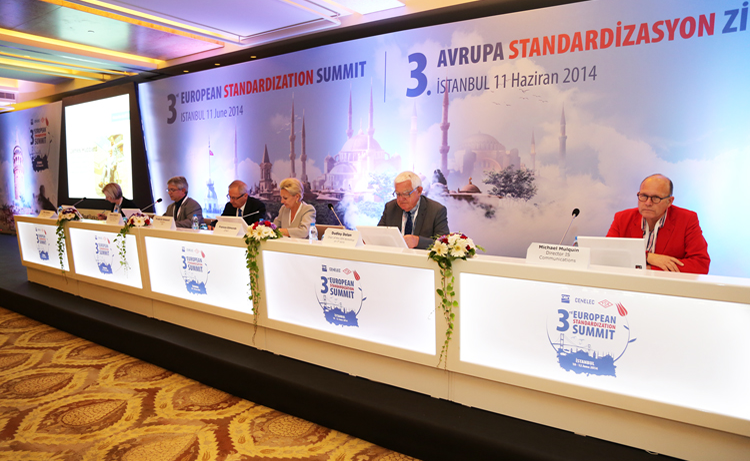
ISTANBUL – The European Standardization Organizations are ready to work with business and other stakeholders, including groups representing older citizens and consumers, to develop age-friendly standards that will meet the needs of an ageing population and support the growth of the silver economy in Europe. This is the main conclusion to be drawn from the discussions that took place at the 3rd European Standardization Summit in Istanbul (Turkey) on 11 June 2014.
‘How standardization can support the silver economy’ was the main theme of the Summit, which was organized by CEN and CENELEC (two of the European Standardization Organizations) together with TSE (the Turkish Standards Institution). The event was attended by more than 200 delegates, including leaders from national, European and international standardization organizations, as well as representatives of the Turkish Government, the European Commission and other stakeholders.
Europe is experiencing a significant demographic shift, as millions of people who were born during the so-called ‘baby boom’ (post-1945) are getting older. Average life expectancy is also increasing thanks to advances in healthcare provision and medical science. The result of these changes is that the number of people over 65 years of age is due to double during the next 50 years. Indeed, in the year 2025 it is expected that older citizens (over 65 years) will represent at least 20% of the population in most European countries.
The concept of the ‘silver economy’ refers to a wide range of activities that meet the needs of older citizens and customers. It encompasses housing and the environment, health and safety, transportation, information and communication technologies (ICT), diverse leisure activities, and various kinds of services such as home care services, etc.
The European Standardization Summit in Istanbul was opened by Hulusi Şentürk, President of the Turkish Standards Institution (TSE). The theme of the silver economy was introduced by Ebbe Johansen, Vice-President of AGE Platform Europe, which represents the concerns and interests of older citizens towards the European institutions.
The European Commission Vice-President Neelie Kroes addressed the Summit by means of a specially-recorded video message. She highlighted healthcare as an area where standards can contribute to improving the lives of older citizens. She also underlined the economic benefits that Europe can gain from tapping into the global silver economy, which is worth around €3 trillion annually. According to Vice-President Kroes: “Silver is the new gold!”
The programme of the Summit included parallel sessions where specific areas were analysed and discussed in depth. Topics addressed included: ‘Standardization in relation to healthcare services’; ‘Age-friendly cities, homes and environments’; ‘Skills for the silver economy’; and ‘Technology & innovation for independent living and active ageing’.
Delegates learned about various standardization activities that are already being developed by CEN and CENELEC in cooperation with relevant stakeholders, notably in relation to ‘Design For All’ and ‘Accessibility in the Built Environment’, as well as so-called Smart Homes (‘Home and Building Electronic Systems’). CEN and CENELEC are also collaborating with ETSI on standards for the accessibility of products and services in the ICT domain as well as in relation to ‘Smart and Sustainable Cities and Communities’.
The conclusions of the Summit were summed-up during the final plenary session by the President of CEN, Friedrich Smaxwil. He noted that the demographic shift currently underway in Europe represents both “a major challenge for our societies and for our public services” and “a golden age of opportunities for companies that are ready and able to meet the needs of older consumers”.
“At the same time, it is also a huge opportunity for the European Standardization Organizations, if we are able to show that our standards can also contribute to meeting the needs of older citizens and consumers,” said the CEN President.
According to Mr Smaxwil, the Summit in Istanbul “has highlighted the importance of working in close cooperation with all the relevant stakeholders, including businesses, public authorities and service providers, as well as organizations that are able to represent the needs and wishes of older citizens and consumers”. The outcomes of the Summit will help CEN and CENELEC to strengthen their collaboration with all the relevant stakeholders and develop many more age-friendly standards in the coming years.












